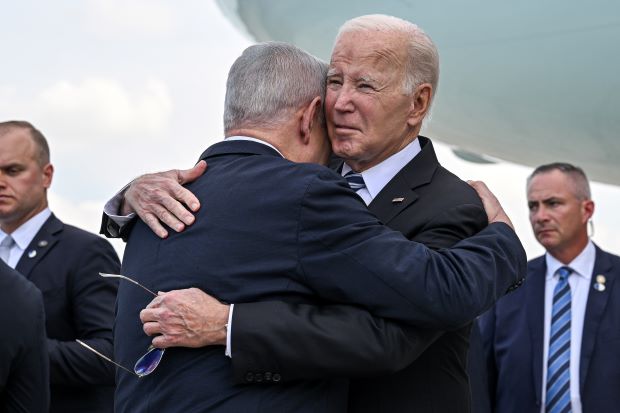Biden backs Israel’s denial of responsibility for Gaza hospital blast

By Peter Baker
TEL AVIV, Israel — President Joe Biden came to Israel’s defence on Wednesday (18), flying into the country at war for an audacious visit and backing its denial of responsibility for the devastating explosion that killed hundreds of Palestinians at a hospital in Gaza.
With the region convulsing with anger and protests after the blast, the president rejected Palestinian claims that the hospital was destroyed by an Israeli airstrike and instead endorsed the government’s insistence that it was an errant rocket fired by Islamic Jihad, an extremist group aligned with Hamas.
“Based on what I’ve seen, it appears as though it was done by the other team, not you,” Biden said unprompted as he sat in a Tel Aviv hotel next to Prime Minister Benjamin Netanyahu of Israel in a show of solidarity.
“But there’s a lot of people out there not sure,” he said, referring to scepticism in the Arab world. “So we’ve got a lot, we’ve got to overcome a lot of things.”
Biden said at another public session later in the day that he relied on a US military evaluation in drawing his conclusion. Asked by a reporter what made him so sure it was not Israel, he said, “The data I was shown by my Defence Department.”
The timing of the president’s visit could hardly have been more precarious politically. After an all-night flight from Washington, Biden landed in a country traumatized by terrorism and girding for a protracted war against Hamas, putting himself at the centre of a volatile conflict as rockets and recriminations volley back and forth with no end in sight.
His meetings with Netanyahu and the Israeli war Cabinet shared a split screen with broken bodies being pulled from the rubble of the decimated hospital. It was unclear whether an American endorsement of Israel’s denial of responsibility would convince many in the Arab world, where protests have broken out in capitals around the region.
Biden was determined to allow no daylight between him and Israel, even as he pressed privately for the resumption of humanitarian aid to Gaza and stressed the importance of minimizing civilian casualties. “I want you to know you’re not alone,” he said with the cameras on. “You’re not alone. As I emphasized earlier, we will continue to have Israel’s back.”
In addition to the Israeli officials, Biden met with survivors and relatives of victims of the Hamas attack on Oct. 7, moving around a hotel conference room and listening to each of them tell their story one by one. Several cried as they recounted their stories, and the president gave each of them a hug.
Among them was Rachel Edri, a retired grandmother who was held hostage at gunpoint in her home for 20 hours and used food and conversation to keep her captors calm and stall them until she could be rescued. Her son, Evyatar Edri, is a police officer who helped free his parents.
Another was Amir Tibon, who huddled in the dark with his wife and two daughters for 10 hours as his kibbutz was attacked by Hamas gunmen until his father, Noam Tibon, a retired general, rushed to his rescue armed only with a handgun.
Netanyahu, who had been at odds with Biden for much of the year until the Hamas attack, appeared delighted to highlight the president’s visit. “From the moment Israel was attacked, you have rightly drawn a clear line between the forces of civilization and the forces of barbarism,” Netanyahu said.
The Israeli prime minister again recounted for Biden the horrors of the attack, describing women being raped, soldiers being beheaded and children hunted down in hiding places in their homes. “Just imagine, Mr. President, the fear and the panic of those little children in their last moments as the monsters discovered and found out their hiding places,” Netanyahu said.
Biden’s public support for Israel, aides said, did not mean that he would not press Netanyahu in private. Israel has declared a siege of Gaza, cutting off food, electricity, medicine and other supplies while its airstrikes result in hundreds of deaths.
“He’ll be asking some tough questions,” John F. Kirby, a spokesperson for the White House National Security Council, told reporters on Air Force One as the president flew over the Atlantic. “He’ll be asking them as a friend, as a true friend of Israel.”
Asked what the “tough questions” would be, Kirby stressed that the president would not lecture Israelis on what they should do. “By tough questions, I don’t mean menacing or in any way adversarial,” he said. “Just hard questions that a good friend of Israel would ask.”
-New York Times


Comments are closed, but trackbacks and pingbacks are open.